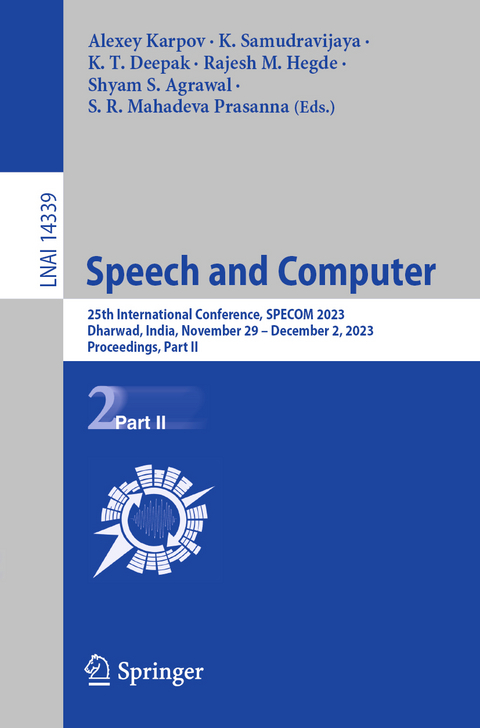
Speech and Computer
Springer International Publishing (Verlag)
978-3-031-48311-0 (ISBN)
The 94 papers included in these proceedings were carefully reviewed and selected from 174 submissions. They focus on all aspects of speech science and technology: automatic speech recognition; computational paralinguistics; digital signal processing; speech prosody; natural language processing; child speech processing; speech processing for medicine; industrial speech and language technology; speech technology for under-resourced languages; speech analysis and synthesis; speaker and language identification, verification and diarization.
Industrial Speech and Language Technology.- Analysing Breathing Patterns in Reading and Spontaneous Speech.- Audio-Visual Speaker Verification via Joint Cross Attention.- A Novel Scheme to Classify Read and Spontaneous Speech.- Analysis of a Hinglish ASR System's Performance for Fraud Detection.- Anomaly Detection in Speech: A Comprehensive Approach for Enhanced Speech Analysis.- CAPTuring Accents: An Approach to Personalize Pronunciation Training for Learners with Different L1 Backgrounds.- Speech Technology for Under-Resourced Languages.- Improvements in Language Modeling, Voice Activity Detection, and Lexicon in OpenASR21 Low Resource Languages.- Phone Durations Modeling for Livvi-Karelian ASR.- Significance of Indic Self-Supervised Speech Representations for Indic Under-Resourced ASR.- Study of Various End-to-End Keyword Spotting Systems on the Bengali language under Low-Resource Condition.- Bridging the Gap: Towards Linguistic Resource Development for the Low-Resource Lambani Language.- Studying the Effect of Frame-Level Concatenation of GFCC and TS-MFCC Features on Zero-Shot Children's ASR.- Code-Mixed Text-to-Speech Synthesis under Low-Resource Constraints.- An End-to-End TTS Model in Chhattisgarhi, a Low-Resource Indian Language.- An ASR Corpus in Chhattisgarhi, a Low Resource Indian Language.- Cross Lingual Style Transfer using Multiscale Loss Function for Soliga: A Low Resource Tribal Language.- Preliminary Analysis of Lambani Vowels and Vowel Classification using Acoustic Feature.- Curriculum Learning based Approach for Faster Convergence of TTS Model.- Rhythm Measures and Language Endangerment: the Case of Deori.- Konkani Phonetic Transcription System 1.0.- Speech Analysis and Synthesis.- E-TTS: Expressive Text-to-Speech Synthesis for Hindi using Data Augmentation.- Direct vs Cascaded Speech-to-Speech Translation using Transformer.- Deep Learning based Speech Quality Assessment Focusing on Noise Effects.- Quantifying the Emotional Landscape of Music with Three Dimensions.- Analysis of Mandarin vs. English Language for Emotional Voice Conversion.- Audio DeepFake Detection Employing Multiple Parametric Exponential Linear Units.- A Comparison of Learned Representations with Jointly Optimized VAE and DNN for Syllable Stress Detection.- On the Asymptotic Behaviour of the Speech Signal.- Improvement of Audio-Visual Keyword Spotting System Accuracy using Excitation Source Feature.- Developing a Question Answering System on the material of Holocaust survivors' testimonies in Russian.- Enhancing Children's Short Utterance based ASV using Data Augmentation Techniques and Feature Concatenation Approach.- Studying the Effectiveness of Data Augmentation and Frequency-DomainLinear Prediction Coefficients in Children's Speaker Verification under Low-Resource Conditions.- Constant-Q based Harmonic and Pitch Features for Normal vs Pathological Infant Cry Classification.- Robustness of Whisper Features for Infant Cry Classification.- Speaker and Language Identification, Verification, and Diarization.- I-MSV 2022: Indic-Multilingual and Multi-Sensor Speaker Verification Challenge.- Multi-Task Learning over Mixup Variants for the Speaker Verification Task.- Exploring the Impact of Different Approaches for Spoken Dialect Identification of Konkani Language.- Adversarially Trained Hierarchical Attention Network for Domain-Invariant Spoken Language Identification.- Ensemble of Incremental System Enhancements for Robust Speaker Diarization in Code-Switched Real-Life Audios.- Enhancing Language Identification in Indian Context through Exploiting Learned Features with Wav2Vec2.0.- Design and Development of Voice OTP Authentication System.- End-to-End Native Language Identification using a Modified Vision Transformer(ViT) from L2 English Speech.- Dialect Identification in Ao using Modulation-based Representation.- Self-Supervised Speaker Verification Employing Augmentation Mix and Self-Augmented Training-based Clustering.
| Erscheinungsdatum | 22.11.2023 |
|---|---|
| Reihe/Serie | Lecture Notes in Artificial Intelligence | Lecture Notes in Computer Science |
| Zusatzinfo | XXVI, 568 p. 195 illus., 141 illus. in color. |
| Verlagsort | Cham |
| Sprache | englisch |
| Maße | 155 x 235 mm |
| Gewicht | 902 g |
| Themenwelt | Informatik ► Theorie / Studium ► Künstliche Intelligenz / Robotik |
| Schlagworte | acoustic signal processing • Artificial Intelligence • Automatic speech recognition • Correlation Analysis • Mathematics • Natural Languages |
| ISBN-10 | 3-031-48311-1 / 3031483111 |
| ISBN-13 | 978-3-031-48311-0 / 9783031483110 |
| Zustand | Neuware |
| Haben Sie eine Frage zum Produkt? |
aus dem Bereich


